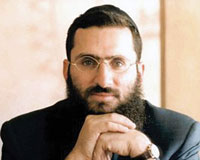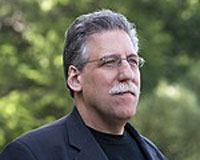Whose Messiah? Jews debate Jesus
by - 13th May 2008
 Newsweek magazine dubbed him ‘America's most famous Rabbi’: Shmuley Boteach (pronounced Bote'ach), and Dr. Michael Brown, ‘the world's foremost Messianic Jewish apologist’, went head to head over belief in Jesus, Monday (12 May).
Newsweek magazine dubbed him ‘America's most famous Rabbi’: Shmuley Boteach (pronounced Bote'ach), and Dr. Michael Brown, ‘the world's foremost Messianic Jewish apologist’, went head to head over belief in Jesus, Monday (12 May).
Moderated by the Reformed Rabbi Dan Cohn-Sherbok, Professor of Jewish Theology at the University of Wales, the event was sponsored by Christian Witness to Israel and Chosen People Ministries, and started provocatively enough with a jab from Brown: if Jesus is not the Jewish Messiah, he cannot be the Saviour of the World, and the Jewish people will never have a Messiah.
 Brown, whose website describes him as ‘a former heroin-shooting, LSD-using Jewish rock drummer’ has devoted his life since his conversion in 1971 to Jewish revival. He traced the fulfilment by Jesus of the two aspects of Messiahship: meekness and authority, Priesthood and Kingship. Jesus came, first, and for ever, as Priest, atoning for the sins of the people by being himself the guilt-offering; then he would come, crowned and as King. The Messiah's mission was to being Israel back to God, who would make the Israelite people a light to the nations.
Brown, whose website describes him as ‘a former heroin-shooting, LSD-using Jewish rock drummer’ has devoted his life since his conversion in 1971 to Jewish revival. He traced the fulfilment by Jesus of the two aspects of Messiahship: meekness and authority, Priesthood and Kingship. Jesus came, first, and for ever, as Priest, atoning for the sins of the people by being himself the guilt-offering; then he would come, crowned and as King. The Messiah's mission was to being Israel back to God, who would make the Israelite people a light to the nations.
Iniquity had to be expiated. How? Jesus did it by sacrificing himself, once for all. If it didn't happen then, it never would. The Messiah had come ‘right on schedule’. As for us, if we hadn’t recognised Jesus as King, as Messiah, there was still time to do so. Brown’s tone was pleading, his delivery urgent, declamatory. The debater's rhetoric soared into preaching.
Boteach, by contrast, began his main speech calmly, almost wistfully, recalling a recent Oxford debate in which Professor Dawkins, ever the diplomat, had likened him to Hitler – on Holocaust Remembrance Day. Had England become the epicentre of the rising tide of anti-Semitism? he wondered. Jewry and Judaism suffered much from atheists for being the source of monotheism.
The tempo quickened as Boteach cited and recited the Shema as witness to the sheer impossibility of there being a triune God. How objectionable it was to say that we were born in sin. The sins of the fathers would not be visited on the children; the fathers were the glory of the sons. If the Lord God abhorred human sacrifice, as Ezekiel said, how could anyone say that God the Father would sacrifice his Son?
What did God want? He wanted obedience to his laws. We atoned principally through repentance. The Law was eternal, the Covenant could not be broken. Mercy and justice could be ours, and the world could be redeemed by just laws. Finally, the Jews, having ‘been here’ 3,300 years longer than Christians, were still having to defend themselves against calumnies and violent assault. If we ripped Jews from their faith by conversion, the world would be greatly impoverished.
In the shorter exchanges and the answers to some ten questions from the floor, Boteach emphasized the beauty and excellence of Judaism's ethical monotheism and its universality (God, incorporeal, without gender or race, is a God for everyone); he praised its healthy abhorrence of uniformity and its regard for Islam and Muslims, who had often given refuge to Jews fleeing from persecution by Christians.
Brown defended the doctrine of the Trinity, with quotations from the Old Testament; Christians were the most persecuted people, yet the more they suffered, the more the people attacking them were changed; he repeatedly referred to the power of the Gospel to change people's lives radically and to inspire them to serve those in need. He also emphatically denied belief in ‘replacement theology’ which claims Christianity was intended to replace Judaism.
The passion with which the speakers argued their case played well with the crowd. Both tended to give excessively detailed textual references, which, in the breathless, fast-moving ‘action’ of rabbinical thrust and parry, got lost to all but the sharpest listeners. But this was a momentous evening for those present whom the prophet of another monotheistic faith called ‘the people of the Book’; may they indeed rejoice together in the words of David, ‘Our help is in the name of the Lord, who made heaven and earth’.
Rabbi Shmuley Boteach and Dr Michael Brown will be debating again today, Tuesday, 13th May, at The Town Hall, Oxford at 7:00 pm.
- Log in to post comments
